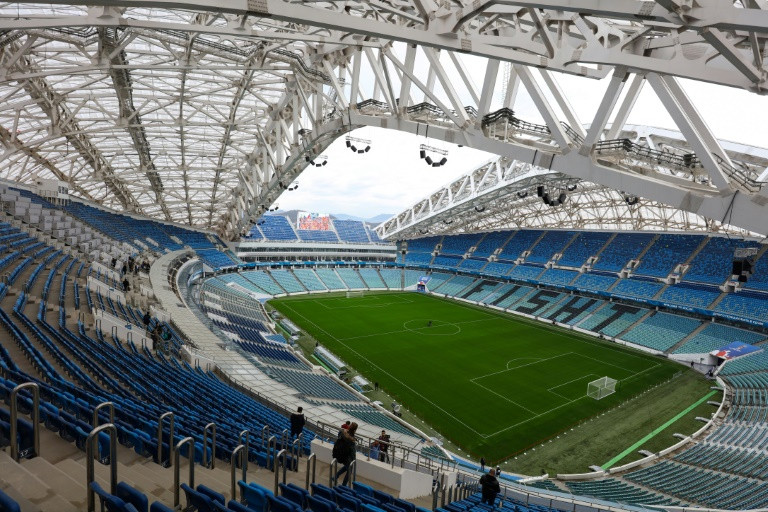
Fisht Stadium in Sochi has hosted a Winter Olympics and will host six World Cup games, but the city does not have a club (Photo: AFP)
Russia intends to spend more than $200 million (160 million euros) to make sure stadiums built for the World Cup do not go to waste after the showpiece ends.
The hosts are trying to use the football final to revive fan interest in the struggling domestic leagues.
Each of the 11 host cities is either getting a brand new arena or having an existing one refurbished from the ground up.
The idea is to replace cavernous all-purpose stadiums in which supporters are exposed to the sun and snow with modern ones outfitted with the latest amenities.
Vladimir Putin issued an order last October requiring his government to draft a World Cup "legacy" programme that raises club-match attendance and boosts youth player development.
But the question long facing Russia has been how to reap rewards from the massive investment in cities where local clubs play second-tier football.
The cabinet's proposal published on Tuesday admits that the government will have to foot the bill in some places until 2023.
"Keeping in mind the high cost of stadium operations and the low expected football club revenues, it is impossible to expect stadium use to be commercially viable in the next 3-5 years," the government programme says.
The government would like to assign a total of 16.6 billion rubles ($265 million) to the legacy programme.
Most of that money -- $190 million -- will come from the federal budget and be assigned to keeping stadiums open in seven of the smaller host cities.
Some will also be spent on training facilities and youth football centres.
Russia may be taking the biggest risk of all in the Black Sea resort city of Sochi.
Putin wants to turn his favourite vacation spot into a sporting capital that attracts global competitions year round.
Sochi was home to the 2014 Winter Olympic Games -- the port is surrounded by snow-capped mountains -- and will host World Cup games stretching through the quarter-finals.
But its local club announced a "one-year break" last year due to a cash shortage.
The government wants to add another 4,000 seats to the 40,000 in Sochi's Fisht Stadium so that it can stage up to 20 "mass cultural events a year" once the football ends.
It does not specify whether these would be related to sport.
Moscow admits that it will not turn a profit as host despite a short-term tourism boost.
Yet it views the international football extravaganza as a chance to modernise its provinces and make a long-term investment in a game that has struggled since Soviet times.
It also dearly wants to avoid getting stuck with white elephant stadiums that were built for major events and later turn into abandoned symbols of mismanagement and excess.
The problem has most recently attracted attention after the 2014 World Cup and 2016 Summer Olympic Games both in Brazil.


